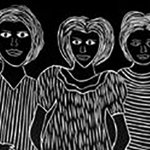As emphasised in the national Close the Gap Campaign, important improvements have occurred in narrowing the health and life expectancy gap between Aboriginal and Torres Strait Islander peoples[1] and non-Indigenous Australians, including among children and young people (Lowitja Institute, 2021, p.2). The Overcoming Indigenous Disadvantage report (2020) highlighted a decrease in infant and child mortality rates, an increase in child attendance at early childhood education before school, and gains made in numbers of Aboriginal young people completing secondary education and certificate qualifications (SCRGSP, 2020). However, Aboriginal children and young people in Australia today continue to experience greater levels of disadvantage than their non-Aboriginal counterparts in most health and socioeconomic indicators (SCRGSP, 2020).
Young Aboriginal women are a population worthy of specific attention. Recently, the Wiyi Yani U Thangani (Women’s Voices) project (2020), conducted by Aboriginal and Torres Strait Islander Social Justice Commissioner June Oscar, identified Aboriginal girls and women, in particular, as “one of the most marginalised and politically disenfranchised groups in Australia, and consequently one of the most vulnerable groups” (Australian Human Rights Commission, p. 81). The Project engaged about 2,300 girls and women across Australia and aimed to ensure that the voices of Aboriginal girls and women are central to the dialogue for continuing to strengthen outcomes for current and future generations. The approach taken for Wiyi Yani U Thangani reflects a sentiment often voiced but not always observed: that the key to overcoming Indigenous disadvantage is “to involve us, to listen, to reform and invest” in Aboriginal designed and led solutions to improve the wellbeing of Aboriginal people (Lowitja Institute, 2021, p.2).
Consistent with this approach, the YAWG project[2] worked with young Aboriginal women and girls to share their stories around drinking, fighting, offending, help seeking and resilience. The project was a community-driven, participatory action research collaboration between researchers at the National Drug Research Institute, Curtin University, and Wungening Aboriginal Corporation in Perth, Western Australia. The research sought to engage Aboriginal girls and young women (10-18 years) in conversations about their lives and provide an opportunity for them to take the lead in developing and promoting health messages. The concept arose from the findings of a former Healthway-funded project, Drinking in the Suburbs: the Experiences of Aboriginal Young People (Wilson, et al., 2013), which revealed the high rate of harms experienced by participants; harms brought about by fighting, drinking and offending. While similarities existed in experiences between the young men and women in this earlier study, important differences were noted, particularly around female participants’ help-seeking behaviours and reports of barriers to engagement with service providers. At the direction of Aboriginal stakeholders involved in Drinking in the Suburbs, YAWG set out to explore in more depth the experiences and perspectives of Aboriginal girls and young women around fighting, drinking and offending; their experiences accessing services to seek help with issues they faced in their lives; and, to inform – with the active involvement of participants – potential prevention strategies targeting this group.
The YAWG website was developed as a result. It was designed to assist those working and coming into contact with young Aboriginal women and girls to better understand their lived realities. It provides the opportunity for workers to hear the girls and young women’s stories, to open up dialogue with this group in a way they feel comfortable and safe with, and to support and empower them to make informed decisions around difficult topics. They are the experts in their lives; as described by participants, an invitation has been extended to ‘see behind their curtains’. The phrase ‘behind my curtain’ became an important metaphor for understanding the young women’s daily lives and experiences, most of which, they felt, were concealed from and foreign to others.
The YAWG website, which includes oral and written narratives from the young women who participated in the research, has three primary purposes. First, it can be used as: a professional development resource; second, as a tool to build engagement and talk with young women about complex and sensitive issues; and third, as a resource to consider when planning for organisational development (instructions for use are included). It is important to note that not all participants involved in YAWG had taken part in the behaviours explored in the research, and experiences of adversity did not always dictate high risk behaviour or determine the young women’s ability to make positive choices in their lives. As such, the content of the website acknowledges the strengths of many young Aboriginal women, but it also provides insight into challenging topics and the everyday struggles participants faced. However, in doing so the girls and young women tell us in their own words how best they can be supported and empowered to live their best lives.
The time to listen is now.
The YAWG website can be found at yawg.info and contains links to previous reports and further resources.
[1] For the rest of this article, when we speak of Aboriginal people, we include those who identify as Aboriginal, Torres Strait Islander, and Aboriginal and Torres Strait Islander.
[2] Fighting, Alcohol and Offending: Interventions Targeting Aboriginal Girls (YAWG) was a three year Health Promotion Research project funded by Healthway.












